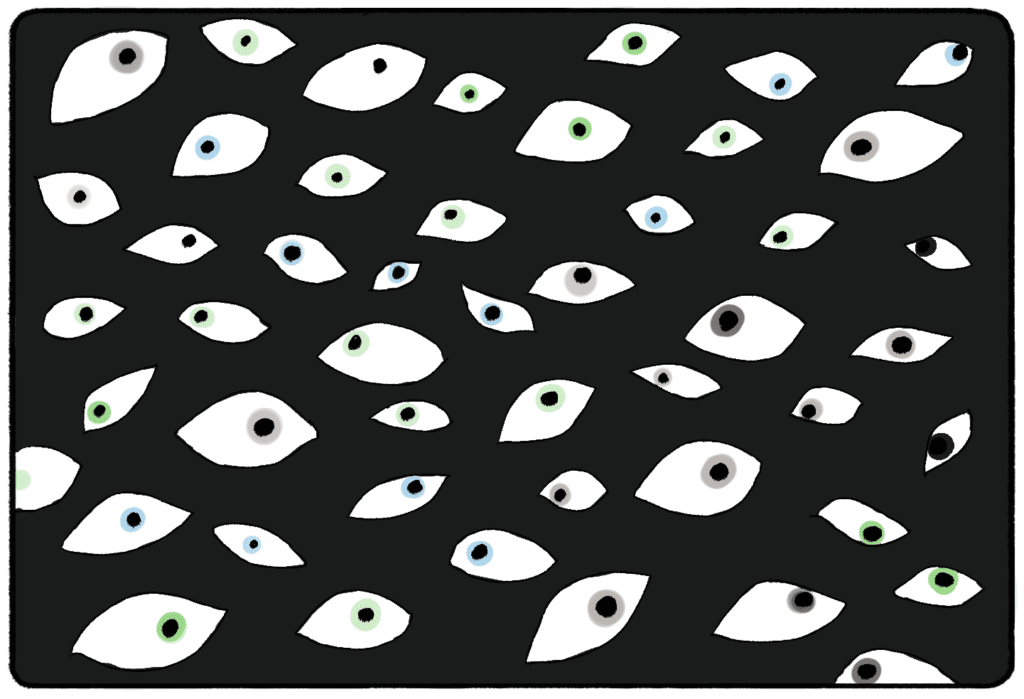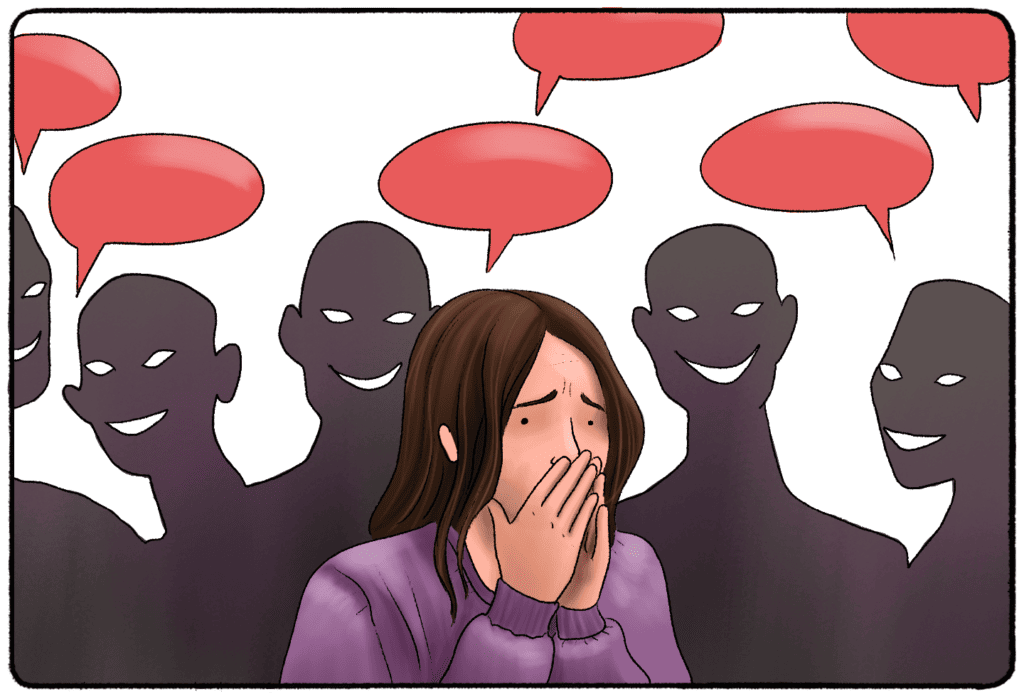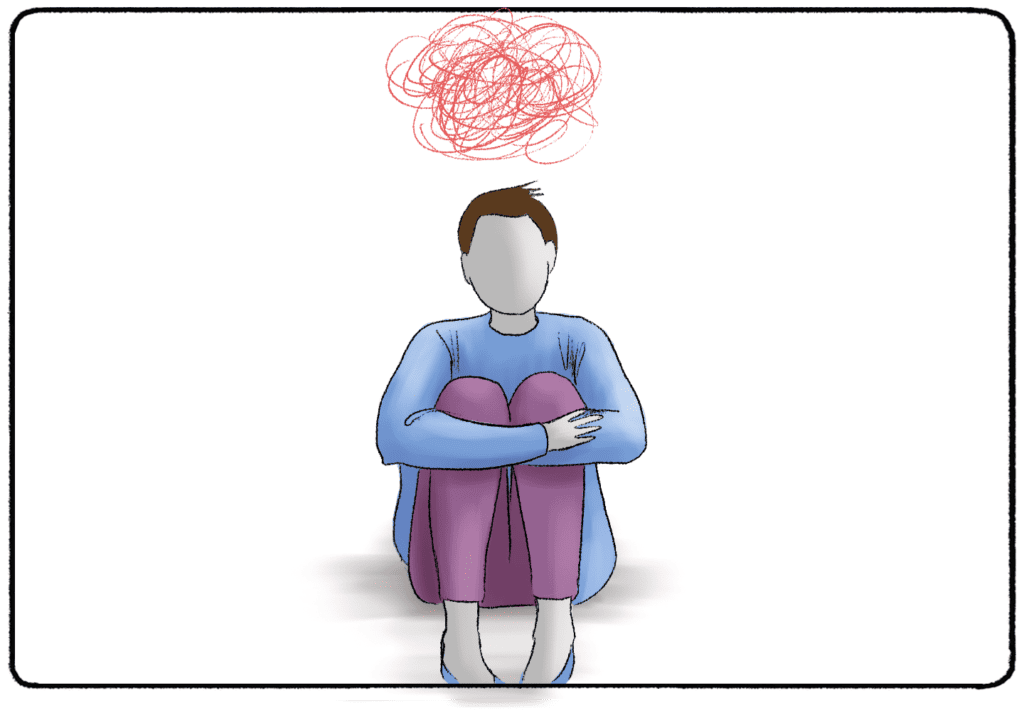A student named Frances is about to give a presentation in front of a large audience. As she is getting ready to speak, she is aware of people looking at her and scrutinizing her every move. Although she is well prepared, Frances finds it hard to concentrate. Her mind is flooded with negative thoughts. She blushes, starts shaking, and feels the urgent need to get out of the room. She is convinced that people are observing her and judging her awkwardness while in reality, nobody notices. This type of anxiety is called scopophobia.
What Is Scopophobia?
Scopophobia is a fear of any sort of visual attention, such as being looked at or being photographed, for example. Other names for scopophobia are scoptophobia and ophthalmophobia. Scopophobia is a social phobia or social anxiety disorder triggered by interpersonal interactions.

When Was Scopophobia Discovered?
The term scopophobia was first mentioned in 1906 in the psychiatric journal The Alienist and Neurologist, a few years after French psychiatrist Pierre Janet described the irrational fear of being watched in some of his patients.
Scopophobia Triggers
The anxiety that triggers socopophobia is made worse in social situations involving large crowds such as public speaking. People with scopophobia are often not only terrified by the looks of strangers but also people they know well, including friends and family members. What is more, the fear is present even when the attention of others is not negative.
While having some amount of social anxiety is not unusual, the fear related to scopophobia is disproportional compared to the actual risk. A mere thought of being looked at can be enough to cause a full-blown panic attack. Even though there is no danger, the body gets into the fight-or-flight mode, releasing adrenaline and making the person feel extremely stressed.
The fear of being observed is a unique kind of phobia. It is considered as being both a social phobia—because it takes place in a social setting—and specific phobia since it focuses on a particular type of interaction and manifests itself in detailed fear.
So what triggers scopophobia?
Scopophobia triggers depend on the severity of anxiety. While some individuals are affected only under extreme circumstances such as speaking in front of large groups, people suffering from severe scopophobia are constantly afraid of being observed. Their intense reactions may be triggered every time they are surrounded by others.

What Are the Symptoms of Scopophobia?
Like all phobias, scopophobia results from an exaggerated thought process that causes an emotional chain reaction. Scopophobia is accompanied by a range of physical and psychological symptoms, including:
- blushing
- excessive sweating
- increased heart rate
- restlessness
- uncontrollable shaking or trembling
- hyperventilation
- muscular tension
- dizziness and nausea
- confusion and difficulty concentrating
- irrational feeling of panic
To make matters worse, people experiencing scopophobia may suffer from additional related phobias like fear of blushing (erythrophobia) or fear of public speaking (glossophobia). These phobias will, in their turn, also trigger a set of symptoms like heart palpitations and nausea.
Many people suffering from scopophobia avoid exposure to any situation where there is a probability of being watched. They often refuse to participate in social activities, afraid that meeting other people will trigger their anxieties. As a consequence of having little or no social contact, these individuals are often more prone to depression.
Is Scopophobia Common?
This is not rare. About one in eight people experience a social anxiety disorder like scopophobia. There is a whole Reddit thread discussing scopophobia. If this condition sounds familiar, know that you are not alone!
What Causes Scopophobia?
Several different conditions can cause scopophobia.
Genetics
Genetics can play a role in social anxiety, although it is not the most common cause of scopophobia. People with a family history of social anxiety disorder have an increased risk of developing it themselves.
Early negative experiences
Many phobias, including scopophobia, are triggered by a traumatic experience in early childhood. Studies show that children who have experienced public ridicule, bullying, or abuse are more likely to develop the fear of being stared at later in life.
Physical deformity
A person with physical deformities caused by illness or injury is more likely to be stared at and can over time develop the fear of being watched. In general, individuals with low self-esteem due to a negative body image have a heightened risk for scopophobia.
Neurological conditions
Some people with epilepsy, schizophrenia, autism spectrum disorders or Tourette’s syndrome can develop scopophobia. They are either afraid that being stared at may trigger an episode or fear that having an episode will cause unwanted attention.

How to Manage Scopophobia
If left untreated, this fear can worsen over time. In extreme cases, it will have a severe impact on a person's life. Psychotherapists use several different methods to help people suffering from scopophobia manage their anxieties.
Systematic desensitization
One of the most common strategies used in managing specific phobias is systematic desensitization, also called graduated exposure therapy. The therapy combines relaxation techniques with progressive exposure in order to help patients slowly conquer the phobia.
Patients are being confronted with phobia-related scenarios in their fear hierarchy, from the least threatening (a photo of someone staring) to the most dreaded one (the actual fear-provoking circumstances). Once they are comfortable with one step, they can move on until they are ready to face the most frightening situation.
Cognitive behavioral therapy (CBT)
Cognitive behavioral therapy combines graduated exposure therapy with learning about the mechanisms of fear. It helps patients control their thoughts and feelings, allowing them to replace the sense of being overwhelmed by confidence. The therapy involves understanding and changing the beliefs and thoughts that lead to the phobia.
Hypnotherapy
Hypnotherapy or suggestion therapy is an efficient way to treat many types of phobias. It relies on the ability of the mind to make changes through the use of positively phrased suggestions. The process allows patients to discover the underlying cause of their fear and suppress the automatic negative response to the stimuli.
Meditation
Meditation can help manage anxieties associated with specific phobias and scopophobia is no exception. Meditation makes it possible to control the physical symptoms of anxiety like hyperventilation, increased heart rate, dizziness, and muscle tension. This is achieved through relaxation techniques and breathing exercises, where fear is replaced with a state of calm.



